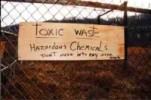The North Carolina Department of Health and Human Services released a health assessment today of the area surrounding the contaminated former CTS of Asheville site. The study declares that there is no elevated rates of cancer in a 1-mile radius, and little risk of contamination spreading, but also declares that new harmful substances such as lead have been found in the monitoring wells in the area.
The Jan. 12 study concluded that — besides those wells that had already tested positive for high amounts of tricholoroethylene, a suspected carcinogen — the chemicals identified in well water, soil and surface water samples “are not expected to harm people’s health,” though department officials recommend further testing of private wells and, if those wells are contaminated, connecting their users to municipal water.
However, NCDHHS also recommends limiting access to streams and springs near the east side of the CTS site, noting that these do pose a risk of spreading contamination: “Elevated contaminant concentrations have been identified in the springs and stream water, should they continue, may present an exposure hazard,” the document reads.
Further, the report is inconclusive about amounts of chromium and lead found in two of the six monitoring wells set up on and near the site for the study.
“There is not adequate information to determine whether groundwater with elevated lead and chromium has been, or is, a source for private drinking water wells,” the report reads, before suggesting further examination. The report found that the two monitoring wells had lead concentrations of 71 and 35 micrograms per deci-liter. Amounts of less than 10 micrograms per deci-liter are known to cause developmental and mental problems in children.
The report also asserts that North Carolina Central Cancer Registry “determined that cancer rates for the population living in a 1-mile radius around the CTS property were not elevated.”
Activists and residents in the area have asserted that federal and state agencies handling the cleanup of the site are more interested in covering up the damage than repairing it, and have lagged in their response. The same activists have produced a map showing 70 cases of cancer in the area.
In April of last year, EPA officials, speaking at a Buncombe County Board of Commissioners’ meeting, said they hadn’t found any evidence of new contamination. In August of that year, a well on Chapel Hill Church Road tested positive for TCE contamination 168 times greater than the legal limit. Area residents pointed to that finding as an example that groundwater contamination is spreading.
Both residents and county health officials have pressed for NCDHHS to release the study findings.
NCDHHS officials will review and discuss the results at a public meeting beginning at 6:30 p.m. Thursday, Jan. 21, at T.C. Roberson High School.
— David Forbes, staff writer



Did anyone really expect the report was going to say anything different?
So, to sum it up, “everything is fine. there is absolutely no risk just don’t get in or drink the water anywhere near the place.”